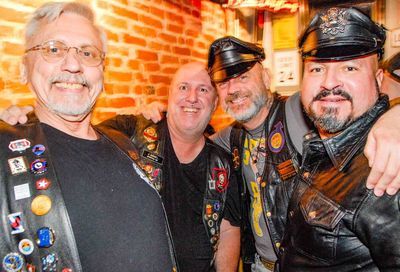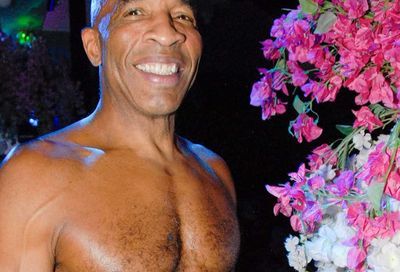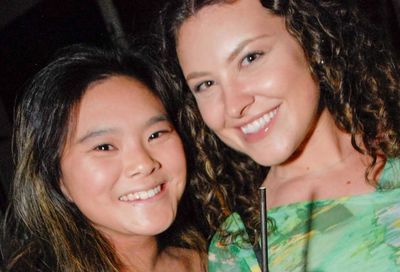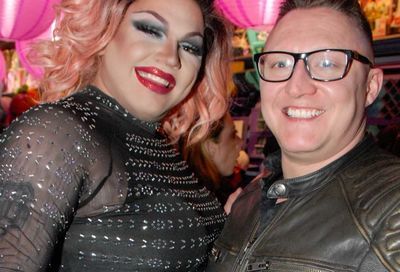Star Quality
Paul Wharton's panache has already made him a breakout sensation on The Real Housewives of D.C. – even before the show's premiere
Paul Wharton likes to be one step ahead of the game. When he was 19 and living in New York City with his gay uncle, a frantic call from his mother had him on a train back to his hometown of Columbia, Md., for a one-on-one conversation with her.
”I was like, ‘Look, so this is the deal. I am gay, and dating, and looking around, exploring things, meeting new people. This is me.”’
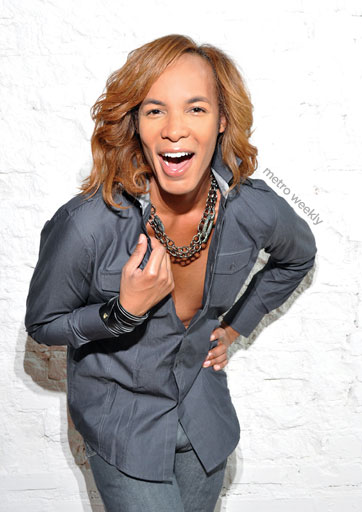
Paul Wharton
(Photo by Todd Franson)
As his mother went into a state of panic, Wharton pondered what all the fuss was about.
”I called you because your American Express bills are too high,” his mother told him. ”You’re spending too much money. I had no idea you were gay.”
Says Wharton, ”She just needed her moment.”
For Wharton, providing that room for a dramatic moment has, in his adulthood, become somewhat his forte. The 32-year-old got his start as a model scout in New York and went on to land a spot as a model coach on MTV’s Made TV show in 2003, helping teens with self-improvement.
Today, Wharton contributes as a broadcaster for the CW’s DC50 network, as a commentator on BET’s Who-Wore-What, and now as a cast member on The Real Housewives of D.C. But he’s more than just what many are referring to as the ”sixth housewife,” crammed between all the drama that is bound to ensue on the new season of the show, set to debut Thursday, Aug. 5, on Bravo.
Wharton is an avid advocate for LGBT youth. He’s involved with the city’s foster youth and hosts the annual D.C. Child and Family Services Agency (CFSA) fashion show each Spring. And now that Housewives has wrapped taping, he hopes to write a memoir documenting his struggles as a gay youth.
But with the Housewives drama about to begin on the small screen, Wharton sat down with Metro Weekly to talk about how he’s dealt with his own drama.
METRO WEEKLY: What is your earliest memory of having an interest in fashion?
PAUL WHARTON: I remember going to Garfinckel’s. I was probably around 7 or 8, going down the aisles and running my hands through the clothes. I just remember this feeling like, ”Oh, I want to be somewhere in this, I just want to be doing this.” But I think the focus wouldn’t have been totally on fashion. I learned about lifestyle topics and issues from my mom just because we lived really well. Even when I was in New York and kind of finding myself and becoming a man, I always had a really fly place. It wasn’t about money. I would just get in there and fix the shit up.
MW: So then do you have a problem with people trying to label what it is that you do?
WHARTON: It’s so interesting. Like I was watching E! News today and they had this thing with Lynda [Erkiletian] from Housewives talking to ”stylist Paul Wharton” about Michaele’s [Salahi] skin.
I’m like, ”How did that stick?” I did that so long ago. That’s something I did in my early 20s. It’s just funny that the mainstream media, you have to give the gay man some kind of title, and the go-to title in our generation is ”stylist.” Everyone is a fucking stylist. Well, I haven’t styled in forever.
MW: So what is the appropriate title for Paul Wharton?
WHARTON: I think for me, because I’m in the business of television, ”TV personality and fashion and lifestyle enthusiast.” That’s what I like.
MW: How did you make it onto The Real Housewives of D.C.?
WHARTON: I had heard around town that they were going to do Housewives, and so I sent [the producers] my media kit. I was like, ”Look. I am the shit in this town. If you want the right bitches on your show, you need to get me. I know all the fun socialites. They’re my friends. And I think that we need to have it be my friends and you can have me on the show.”
They were just very cool and calm and we would have meetings and I didn’t really know what was going to go down, but I just started telling them about different friends of mine and different people and they would go interview them. Obviously they were searching on their own as well, but I know at least a couple of the ladies got on the show because I was friends with them before the show.
MW: What is your role on the show?
WHARTON: One of the housewives the other night, Lynda, said that I am the glue, the only common denominator between all these women. I’m kind of the link, the conversation starter, someone that can connect all these relationships that necessarily weren’t all there before.
I feel like [the storyline] unfolded because I really understand TV. When you’re holding that big-ass heavy camera up on your shoulder and you’re rolling and you’re paying union rates for a crew, you need to get something on camera. With the women having no experience in television, they were all hair and makeup, but then it’s like, ”Oh, yeah, so I took little Johnny to soccer practice…. Oh, and my husband Bill came home and I told him, ‘Only one martini tonight, Bill.”’
Ugh. Boring, boring, fucking boring! I’m like, ”Bill’s been looking really good nowadays, what’s going on with him? Oh, he’s been staying at work late?” You know.
My intention wasn’t to stir things up between people. It was to help create some storylines. When you’re on TV everything just has to be bigger and louder. If you’re not, you just kind of get lost in the shuffle.
MW: In D.C., there seemed to be a storyline with the Salahis even before the cameras started rolling. What did you make of them?
WHARTON: They were good friends, but I feel like I don’t really know who they are now. There’s not really a whole bunch of substance there. I thought I knew who they were. Before, we were really great friends. They would call me, I would call them, we were constantly in touch, we were doing things together, she would come over to my house. And it’s almost like [when there is] someone you really like, you will accept them even though they have some messiness with them. But sometimes people go so far off that you just don’t know who they are anymore. It’s like I don’t know if I ever knew you.
MW: Are you referring to some of the ”messiness” involved with the White House state-dinner crashing last winter?
WHARTON: They went off with the party-crashing thing. With that much publicity that came from that — I haven’t seen them use any of that to do good. It seems so self-serving to me. Don’t go back on TV [saying] the president should apologize to you. Eat dirt. Please. Give me a fucking break. Why are you perpetuating that for more negative press? Just because you think all press is good press? And what are you going to do with this newfound fame? Are you helping anyone else? Have you learned anything? Who are you people? Is it just about this yacht that doesn’t exist, this Aston Martin that was repossessed three years ago that you still claim you drive? It’s just like, get real.
MW: There are rumors that cameras are still following you around after wrapping Housewives. Is it true that you have a spin-off show?
WHARTON: I have a few more things to say. I don’t think I really got out everything I needed to say on Housewives. There’s still some things I didn’t get to explore.
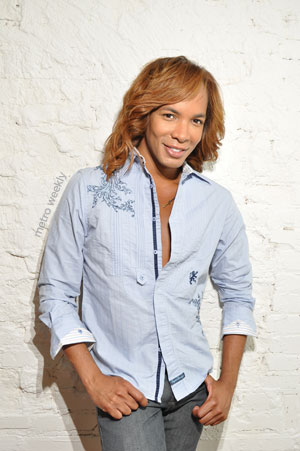
Paul Wharton
(Photo by Todd Franson)
MW: Being on a show about wives, where do you stand on marriage? Do you want to get married?
WHARTON: I could, yeah, definitely. With the right partner. There was a time that I didn’t believe in the sanctity of marriage. Whether it was a man and a man, or woman and man, whatever the combination was, woman and woman, I just didn’t believe it because most people around me, in every experience that I could see, didn’t take it seriously. It was like, ”Okay, let’s get married and then I’m going to go screw that one on the side over here,” or shit gets rocky – ”I’m moving out, I’ll meet you at the courthouse.” It’s like, what’s the point?
But when [City Councilmember] David Catania sponsored the gay marriage-equality bill, I told the producers of the show that it’s important to me to have this on Housewives. And we did. And it becomes one of my interesting storylines on the show because it was what was really happening in real life. I was actually in the [Council] chamber when they passed it into law in D.C. So I think because I was there, and had followed it through, and watched it as it got closer and closer and saw the passion with David and all the other supporters, I kind of think of [marriage] differently now. Now it’s like, it’s my right, and it’s not something that I would do just because I have the right to, but I can and I want to find the right partner.
MW: Looking at that political struggle, how does that compare to your personal ones from being gay?
WHARTON: It’s been interesting doing the work I’m doing now, and living the life that I live now, because I’m really popular. But when you’re growing up gay you spend your life kind of ducking and dodging, not saying too much, trying to be invisible a little bit. Because as soon as they get a sense of who you are, they’re [saying] ”Look at that fag over there.” So I just had a really rough time because kids can be so cruel.
The reason I decided to write [a memoir about life growing up gay] is because with everything that’s going on with Facebook and the Internet and Twitter. They’re using social networking to really make gay kids’ lives miserable.
When I would go to school, my mom was just always very good at keeping a fabulous house. So I remember most kids didn’t want to go home, they wanted to play with their friends — I wanted to get home. My mom was just a really loving person. But she really didn’t know some of the struggles that I had. When I would leave [home and go] to school, from the time that I left to the time I came home, it was pretty bad.
I don’t think people really knew how guarded I was. I was always kind of cool and quiet. My clothes were really nice. But I really didn’t feel like I fit in anywhere. One time I was in middle school and there was this guy, Rodney, he became a friend. Rodney would play sports, he was so popular. He was really a nice person who kind of took to me. I remember these two popular girls were going to have this big party, and everybody was talking about this big party. Somehow or another Rodney finagled me an invite. I spent the whole week [preparing], and I made my mom take me shopping.
After all week long preparing for the party and all this, the phone rings in my house and I answered the phone and it was some of the cool kids at the party. They were like, ”Hey, is this Paul?” And they were all kind of talking to each other, laughing, and they said, ”Fag, you can’t come to the party.”
I just cried and cried. I heard the doorbell ring, and I heard Rodney at the door, ”Is Paul here?” My mom was like, ”I don’t know what’s wrong with him, but he’s not coming.”
It’s really a problem, looking back, when you are too embarrassed to even tell your mother. One thing that parents really need to be mindful of is you have to let your kids off the hook sometimes. Sometimes they just don’t have the strength to tell you everything because you don’t want your parents to pity you – especially if they think you’re a normal, happy-go-lucky kid. You don’t want them thinking, ”Damn he’s got problems.”
The one other time, I found this group of friends in the sixth grade. I loved them so much. Everything was ”Terry, Eric, Chris.” Eric was Jewish and he had a twin sister, so they had a B’nai Mitzvah. At one point during the ceremony, Eric and Michelle were calling their best friends up there. So they call Terry and Chris. I look over right at that moment and my dad was standing there by the doorway. He was watching, and I was so embarrassed. I didn’t know if it was the black thing. I didn’t know if it was the gay thing. I think it could have been a combination of those things. Just when I felt like I had found my little group, that happened and it was the worst ride home ever with my dad. I remember thinking things are falling apart and I can’t even keep these secrets from my parents. I don’t want them to see that I’m different or that people don’t respect me. I felt strong on my own to take it, but it was the acknowledgment by the people that were the closest to me, them knowing that I was struggling with anything with racism, with homophobia, with any of those things, that’s what really bothered me the most.
MW: Did having an older sister help or hurt you adjusting socially, dealing with other kids?
WHARTON: The interesting thing about my sister is she has the biggest heart and she is so sensitive and emotional. That’s why, maybe, when I was coming up she was so hardcore. It was bad enough I got it at school, but when I got home she knew where to go to hurt me, which would be the ”faggot” and the ”gay” and all these things. Siblings fight and my mom did her best to keep my sister off of me, [but] my sister used to beat me up. I had asthma, and she was just bigger than me – taller, bigger, stronger. I was real skinny and shorter than her. She was a real loving sister, but when we would fight she would always win. She could upset me enough with her words that I would literally lose my breath, like I couldn’t speak. It was like my asthma, I couldn’t talk, I would just be silently crying, from intimidation and fear. So I think for a while I was fearful of her. We have a great relationship now.
The interesting thing is how life always turns around. My sister was always Miss Popularity, this that and the other. She got married and had kids really young, and her life changed. All of a sudden it’s about the kids and the husband and where are her friends? Who knows? And all of a sudden it’s like I have all the friends.
I didn’t really get to do fun stuff as a teenager, but my 20s were a blast because I was doing a whole bunch of great stuff in New York, [making] really good cash, and it was like I could do anything. I was partying with the most fabulous people, staying out all night long, going to breakfast in the morning. I had a great place. I had fixed up my little brownstone. It was gorgeous. The scariest part to me about that experience, about getting there and living that great life, is that some kids don’t get that far. I was even one of those kids that was like, ”Maybe I should just kill myself.” I was all the way there. I was at least thinking about it, crying, depressed thinking about it. So I think that it was kind of a really wonderful, powerful watershed. I remember one day I was in New York and I was just crying, because I’m like, what if I would have missed out on this?
MW: Would you say New York saved your life in some way?
WHARTON: I don’t know if New York saved my life. I think people like [my current business partner] Cynthia Wilson saved my life. She owned an agency called New Model Agency. When I was 12, I went to New Model Agency and I started modeling with her. She became like a second mother to me. I felt like Monday through Friday was crap, but Saturday when I would go down there and be with her I would be free, I could be myself.
My mom really did, too, because even though she didn’t really acknowledge that I was gay, and she claims she didn’t know, she was still very nurturing and very loving. I can still, when I really need it, get under her arm and get that love that I need.
My dad, it was so weird…. You know how some gay sons get estranged from their dads? That really wasn’t the case with me. He was just such a wonderful guy. But I remember this one day: I was 16 and he got me a Jag. I remember being so excited to spend time with him. I came to him and I said, ”I want to go to the car show, and on Saturday we can do this, and on Sunday we can do that.” He was like, ”Paul, listen, I am very busy. I have my own stuff going on. Don’t plan your social calendar around me. Get a life.”
Normally I would have gone right to tears, but there was something that switched in me that day. I just got it. It was like, take the keys to your Jag and go get a life.
And that’s what I did. That’s really when I stopped tiptoeing around people and I just stopped being fearful. So I thank him for that, because just him knowing my personality and who I am, I could have gone the other way. I got a life, and I have never looked back.
The Real Housewives of D.C. premieres on Bravo, Thursday, Aug. 5, at 9 p.m. Visit BravoTV.com. For more on Paul Wharton, visit evolutionlook.com.
Support Metro Weekly’s Journalism
These are challenging times for news organizations. And yet it’s crucial we stay active and provide vital resources and information to both our local readers and the world. So won’t you please take a moment and consider supporting Metro Weekly with a membership? For as little as $5 a month, you can help ensure Metro Weekly magazine and MetroWeekly.com remain free, viable resources as we provide the best, most diverse, culturally-resonant LGBTQ coverage in both the D.C. region and around the world. Memberships come with exclusive perks and discounts, your own personal digital delivery of each week’s magazine (and an archive), access to our Member's Lounge when it launches this fall, and exclusive members-only items like Metro Weekly Membership Mugs and Tote Bags! Check out all our membership levels here and please join us today!




















